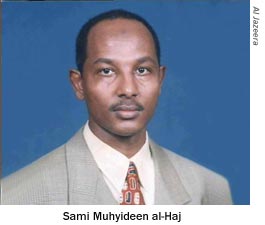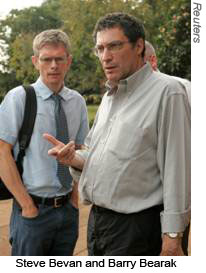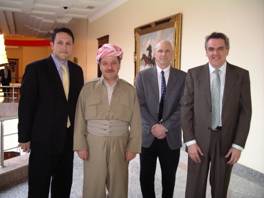|
Sami al-Haj freed from Guantanamo after 6 years
 CPJ welcomed the release of al-Jazeera cameraman Sami al-Haj, who had been held at Guantanamo Bay Naval Base without charge or trial by U.S. forces for more than six years. Al-Haj arrived in his native Sudan in the late evening of May 1, where he had an emotional reunion with his friends and family. CPJ welcomed the release of al-Jazeera cameraman Sami al-Haj, who had been held at Guantanamo Bay Naval Base without charge or trial by U.S. forces for more than six years. Al-Haj arrived in his native Sudan in the late evening of May 1, where he had an emotional reunion with his friends and family.
CPJ repeatedly publicized and brought Al-Haj’s case to the attention of government officials after he was detained in December 2001 by Pakistani forces while covering the U.S. led-offensive to unseat the Taliban. He was later transported by the U.S. military to Guantanamo Bay in June 2002.
In October 2006, CPJ highlighted al-Haj’s plight in a special report titled “The Enemy?” Nicholas Kristof subsequently cited the report in his column in The New York Times, and a campaign by Al-Jazeera turned al-Haj into a household name in the Middle East. After his release, CPJ was interviewed by both media outlets, among others.
AP photographer freed in Iraq after two years
In another major release, Associated Press photographer Bilal Hussein was freed on April 16 from U.S. military custody in Iraq after being detained without charge for two years. Hussein, an Iraqi national who shared in the AP’s 2005 Pulitzer Prize for photography, was detained by U.S. forces on April 12, 2006. The U.S. military alleged that he had ties to Iraqi insurgents, but Hussein was never charged with a crime and none of the evidence against him was made public.
Over the last two years, CPJ frequently petitioned the U.S. government to either release or charge the journalist. In November 2006, CPJ sent a letter to then Secretary of Defense Donald Rumsfeld calling for action in the case. On the one-year anniversary of his detention, CPJ again called for his release or for the U.S. government to produce evidence against him, and in a private meeting in March, CPJ staff raised Hussein’s case with Lt. Gen. William Caldwell, the commander of the Combined Arms Forces in Fort Leavenworth. CPJ has documented the cases of at least eight other Iraqi journalists who have been held by U.S. forces for prolonged periods without charge or conviction.
CPJ helps journalists held in Zimbabwe
CPJ has closely monitored the dramatic events in Zimbabwe, watching for press freedom abuses during this tumultuous electoral season, and successfully worked for the release of four journalists held in April. On April 3, authorities arrested award-winning New York Times reporter Barry Bearak and British freelance journalist Steve Bevan at the Yorke Lodge, in Harare, and accused them of practicing journalism without accreditation. CPJ spoke out immediately against the arrests and worked for their release with local contacts, including media lawyer and 2005 IPFA winner Beatrice Mtetwa.
 Bearak and Bevan were allowed to leave Zimbabwe on April 16 after Harare Magistrate Gloria Takundwa ruled that there were no legal grounds for their arrest. South African freelance cameraman Sipho Moses Maseko and satellite technician Abdulla Ismail Gaibbe of GlobeCast Africa were held in police custody for eight consecutive days after their arrest on March 27, following their facilitation of an interview of Zimbabwean Information and Publicity Minister Sikhanyiso Ndhluvo with CNN. They were acquitted but rearrested the same day, and were finally released on bail after spending three more nights in prison. Bearak and Bevan were allowed to leave Zimbabwe on April 16 after Harare Magistrate Gloria Takundwa ruled that there were no legal grounds for their arrest. South African freelance cameraman Sipho Moses Maseko and satellite technician Abdulla Ismail Gaibbe of GlobeCast Africa were held in police custody for eight consecutive days after their arrest on March 27, following their facilitation of an interview of Zimbabwean Information and Publicity Minister Sikhanyiso Ndhluvo with CNN. They were acquitted but rearrested the same day, and were finally released on bail after spending three more nights in prison.
Since 2005, Zimbabwean authorities have used the accreditation law six times to jail foreign journalists and censor coverage.
CPJ’s Africa Program Coordinator Tom Rhodes is currently visiting Mozambique and South Africa to conduct interviews with local journalists and examine the press climate in the region. Rhodes is meeting with the many exiled Zimbabwean journalists now working and living in South Africa. On May 3, World Press Freedom Day, Rhodes represented CPJ in Mozambique at the World Press Freedom Forum.
In Paris, CPJ participates in Olympic panel
CPJ Board Chair Paul Steiger and Asia Program Coordinator Bob Dietz both spoke at “Beijing Olympics 2008: Winning Press Freedom,” a widely covered conference held in Paris that explored the challenges the thousands of foreign journalists reporting on the Olympics may face. The conference was organized by the World Press Freedom Committee. Steiger spoke on the opening panel and highlighted the risks local journalists will likely encounter. CPJ joined prominent human rights groups and journalists at the conference to discuss efforts to push China to make reforms as the 2008 Summer Olympics approach.
CPJ presents Impunity Index at United Nations
At a press briefing at the United Nations on April 30, CPJ announced its Impunity Index, a ranking of countries around the world where journalists’ killers go free. CPJ board member and Columbia professor Sheila Coronel joined Executive Director Joel Simon and Communications Director Abi Wright for the briefing with the U.N. press corps. The report, compiled for the first time this year, calculates the number of unsolved journalist murders over the last 10 years as a percentage of the population. War-torn countries like Iraq top the list, followed by Sierra Leone and Somalia. But democratic countries in peacetime, including Mexico, the Philippines, and India, make up the majority of countries on the ranking.
CPJ also released a short Web video produced by Wright that takes a closer look at the personal stories of the victims of impunity; Aroun Rashid Deen recounts going into hiding in Sierra Leone as Freetown was under siege from the RUF, Russian editor and 2007 IPFA winner Dmitry Muratov explains the lack of justice in the brutal killing of his colleague, Igor Domnikov, and CPJ board member Sheila Coronel describes the culture of impunity that has become the norm in her native Philippines.
Coverage of the findings has been extensive across Latin America, Russia, and Central Asia; in addition to coverage from the AP, Reuters, and Agence France-Presse, Newsweek did a story on the index, and the Interational Herald Tribune ran a letter to the editor from Joel Simon. Simon was also interviewed on CNN.
CPJ travels to Kurdistan, releases findings
 Deputy Director Rob Mahoney, Middle East Senior Program Coordinator Joel Campagna, and board member Michael Massing traveled to the Kurdistan region of Iraq this week to follow up on a previous mission and to urge the government to protect journalists’ rights to report the news. The delegation presented a special report to KRG President Masoud Barzani, asking him to publicly investigate a spate of violent attacks against the press, end official interference and harassment of journalists, and support press legislation that conforms to international standards of free expression. They also met with the speaker of the KRG parliament, Adnan Mufti, and urged him to remove restrictive provisions still in a press bill under discussion by members of parliament. Deputy Director Rob Mahoney, Middle East Senior Program Coordinator Joel Campagna, and board member Michael Massing traveled to the Kurdistan region of Iraq this week to follow up on a previous mission and to urge the government to protect journalists’ rights to report the news. The delegation presented a special report to KRG President Masoud Barzani, asking him to publicly investigate a spate of violent attacks against the press, end official interference and harassment of journalists, and support press legislation that conforms to international standards of free expression. They also met with the speaker of the KRG parliament, Adnan Mufti, and urged him to remove restrictive provisions still in a press bill under discussion by members of parliament.
After CPJ’s mission in November, Barzani refused to sign a press law that would have tightened restrictions on the media. CPJ had lobbied strongly against it. The full text of the report will appear in the next edition of Dangerous Assignments and will also be available online at www.cpj.org.
Mexican journalists thank CPJ for support
On April 19, CPJ Americas Researcher María Salazar traveled to Mexico as part of a coalition of press freedom groups to investigate attacks and killings of journalists. She was part of a delegation that met with journalists, editors, and media owners, victims and their families, local and federal authorities, as well as human rights and press freedom groups in Mexico. In Mexico City, prominent Mexican journalists like Lydia Cacho and Sanjuana Martínez detailed the important role CPJ advocacy played in their cases. In other areas of the country, journalists who have been attacked and the families of missing journalists thanked CPJ for the support it has provided. The mission concluded with a press conference on April 25 in Mexico City.
CPJ and Columbia host Ekho Moskvy’s Venediktov
On April 24, Aleksei Venediktov, editor of the Russian independent radio station Ekho Moskvy, spoke to a standing-room-only crowd of journalists and academics at Columbia’s Graduate School of Journalism. New Yorker Editor David Remnick interviewed Venediktov and CPJ’s Europe and Central Asia Program Coordinator Nina Ognianova introduced him. Venediktov spoke candidly about the difficulties he faces keeping his independent editorial line in the face of increased pressure from the Kremlin. His radio station remains one of the only independent broadcasters in the country as the situation for independent media in Russia continues to deteriorate.
|
 CPJ welcomed the release of al-Jazeera cameraman Sami al-Haj, who had been held at Guantanamo Bay Naval Base without charge or trial by U.S. forces for more than six years. Al-Haj arrived in his native Sudan in the late evening of May 1, where he had an emotional reunion with his friends and family.
CPJ welcomed the release of al-Jazeera cameraman Sami al-Haj, who had been held at Guantanamo Bay Naval Base without charge or trial by U.S. forces for more than six years. Al-Haj arrived in his native Sudan in the late evening of May 1, where he had an emotional reunion with his friends and family. Bearak and Bevan were allowed to leave Zimbabwe on April 16 after Harare Magistrate Gloria Takundwa
Bearak and Bevan were allowed to leave Zimbabwe on April 16 after Harare Magistrate Gloria Takundwa  Deputy Director Rob Mahoney, Middle East Senior Program Coordinator Joel Campagna, and board member Michael Massing traveled to the Kurdistan region of Iraq this week to follow up on a previous mission and to urge the government to protect journalists’ rights to report the news. The delegation presented a special report to KRG President Masoud Barzani, asking him to publicly investigate a spate of violent attacks against the press, end official interference and harassment of journalists, and support press legislation that conforms to international standards of free expression. They also met with the speaker of the KRG parliament, Adnan Mufti, and urged him to remove restrictive provisions still in a press bill under discussion by members of parliament.
Deputy Director Rob Mahoney, Middle East Senior Program Coordinator Joel Campagna, and board member Michael Massing traveled to the Kurdistan region of Iraq this week to follow up on a previous mission and to urge the government to protect journalists’ rights to report the news. The delegation presented a special report to KRG President Masoud Barzani, asking him to publicly investigate a spate of violent attacks against the press, end official interference and harassment of journalists, and support press legislation that conforms to international standards of free expression. They also met with the speaker of the KRG parliament, Adnan Mufti, and urged him to remove restrictive provisions still in a press bill under discussion by members of parliament.